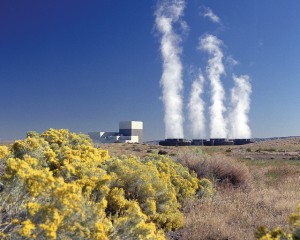The Northwest’s only nuclear plant—the Columbia Generating Station (CGS) in Richland, WA—could cost public power electrical ratepayers about $1.64 billion more than buying the same power on the wholesale market. CGS is operated by Energy Northwest and the Bonneville Power Administration (BPA) is the sole purchaser of its output.
“To best ensure its ratepayers are provided reliable power at the least cost, BPA should conduct its own market test to assess Columbia’s economic competitiveness, as it originally pledged doing in 1998” according to Philip Lusk, the author of a recent analysis.
Lusk is the former Deputy Director of Power & Telecommunications Systems at the Department of Public Works & Utilities, City of Port Angeles, and was a member of Energy Northwest Board of Directors from 2013-2015.
Lusk’s analysis comes a time when nuclear plants across the United States are closing or at risk of closing due to less expensive natural gas, increasing renewable power generation, and energy efficiency measures that are reducing the demand for electricity. It also follows an earlier, detailed report conducted in January, 2014 by McCullough Research for the Oregon and Washington chapter of Physicians for Social Responsibility that concluded, “CGS can be replaced at a significant cost savings to the region’s ratepayers and utilities—approximately a $1.7 billion dollar saving.” The McCullough report had recommended that “BPA issue a Request for Proposals (RFP) for alternatives and displace the unit within the current institutional framework.”
Critics of the McCullough report acknowledged the high costs of operating CGS when its power was “slightly above spot market energy prices,” but they concluded a spike in those market prices could “easily wipe out years of anticipated benefits” associated with shutting the plant down and using replacement power. They pointed to the Western Energy Crisis of 2000-2001, when prices rose significantly, to support their opinion.
However, in the three years since the McCullough report, we have seen major shifts in electricity markets and the Lusk analysis builds on these facts. For instance, wholesale electricity prices are lower now than in 2014 and renewable sources are producing significantly more power. Of course, the solution to power needs is sometimes using less—through energy efficiency—rather than buying electricity.
In fact, Lusk proposes using energy efficiency to replace the power from CGS. “Energy efficiency measures, such as substituting LEDs for inefficient lighting, can more than offset Columbia’s lost capacity in the regional power market,” according to Lusk. He highlights the fact that the region has already saved more than 6,000 average MW of electricity—that’s the equivalent to six nuclear plants the size of CGS—since 1978. That is impressive savings!
The Lusk and McCullough analyses have raised serious questions about the economics of continuing to operate a nuclear power plant in the Northwest. Unfortunately, nuclear supporters maintain blind faith in this power source regardless of the economic, health, and safety consequences of operating nuclear plants. Yes, electric prices may spike someday and make nuclear power temporarily less expensive, but a major accident at the plant is always a risk, the plant even with federal subsidies is expensive, and nuclear waste is forever.
The CGS nuclear plant and its operator started out under a serious cloud. Energy Northwest was originally known as the Washington Public Power Supply System (WPPSS), pronounced “Whoops,” a rather fateful name. WPPSS began construction on five plants, two in western Washington and three at the Hanford Nuclear Reservation. The only one to ever operate was known as WPPSS-2, which had numerous construction problems prior to its going online in December 1984—more than 10 years after obtaining its construction permit from the Nuclear Regulatory Commission. WPPSS defaulted on bonds for the remaining four plants in the early 1980s leading to their being terminated in various stages of construction.
In an attempt to shed its troubled history, WPPSS changed the plant’s name to the benign-sounding “Columbia Generating Station” (CGS). Regardless, nuclear power, and this plant in particular, remain expensive and dangerous sources of power. It’s well past time to shut this one down.

